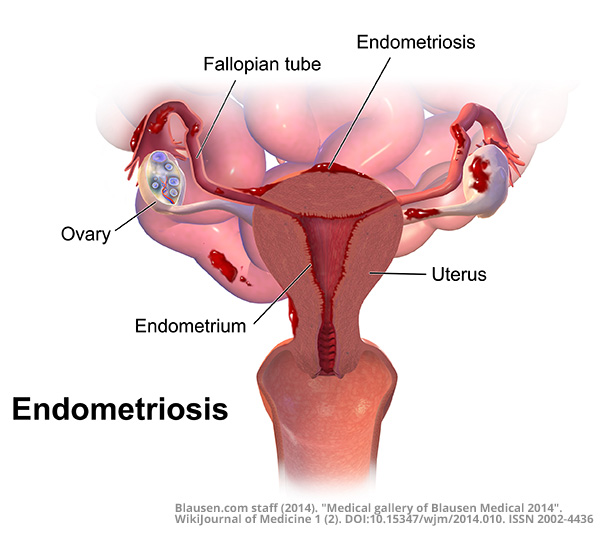What is the role of surgery for endometriosis?
By Moona Arabkhazaeli, MD
Minimally Invasive Gynecologic Surgeon
Surgery can be both diagnostic and therapeutic. At minimum, surgery can provide visual and histologic confirmation about the presence of endometriosis, and unfortunately is the only way to definitively diagnosis the disease. Further, if endometriosis is confirmed and managed surgically, surgery can result in a therapeutic relief in symptoms.
Background: What is endometriosis?
Endometriosis is a disorder in which the tissue that lines the inside of the uterus - the endometrium - grows outside the uterus. Most commonly it is found on the ovaries, the fallopian tubes and the tissue lining your pelvis. Rarely it can be found in other areas, including the intestines, the bladder, and even the lungs or diaphragm. This endometrial tissue grows and bleeds with each menstrual cycle, resulting in production of substances that cause inflammation and pain, and eventually scar tissue.

Who is a candidate for surgery?
People pursue endometriosis surgery for a variety of reasons, and there is no right answer. You don't necessarily have to try and try medical treatment before pursuing surgical treatment. That being said, surgery inherently has risks, so it requires careful consideration and communication with your doctor. Some common motivations for pursuing surgery is the following:
- Persistent pain despite medical therapy
- Unable to or unwilling to take medical therapy
- Desire a confirmation of diagnosis
- Improvement in fertility – fertility implications of endometriosis will be a future blogpost!
How is the surgery performed?
Surgery is generally done laparoscopically, which is a minimally invasive approach. This allows the surgeon to perform the surgery using a camera and instruments inserted into the abdomen via several small incisions. In certain cases, the surgeon will employ the robotic technology; this is an advanced type of laparoscopy that couples high-definition, three-dimensional cameras with specialized surgical instruments that have greater dexterity and range of motion. The addition of the robot allows for more complex procedures, such as extensive endometriosis surgery, to be performed laparoscopically.
What are the options for surgery?
Endometriosis surgery can consist of excision or ablation and can be conservative or definitive.
In surgery, endometriosis lesions can be destroyed through excision (removing tissue) or ablation ("burning" tissue). While outcomes are similar in some studies, excision allows for a histologic diagnosis and can address deeper lesions as compared to ablation. For these reasons in my practice I favor excision over ablation.
Conservative or Definitive Approaches to Surgery
Conservative surgery involves destruction of endometriosis lesions, while preserving the uterus and ovaries. Conservative surgery is generally first line, as it preserves fertility and hormonal function, is less invasive, and has short-term efficacy. Conservative laparoscopic excision of endometriosis reduces overall pain in 73% of patients. Unfortunately, the recurrence rate can be high, with up to 58% of patients needing repeat surgery.
Definitive surgery includes hysterectomy (removing the uterus), with or without oophorectomy (removing the ovaries). This is reserved for people with persistent bothersome symptoms who do not plan on future childbearing. The main benefit is a lower long term recurrence rate; one study reports a 19% reoperation rate after hysterectomy, compared to 58% with conservative surgery.
Topics
Share this page:
About the Author
Moona Arabkhazaeli, MD
Minimally Invasive Gynecologic Surgeon
 Dr. Moona Arabkhazaeli brings specialized expertise in Minimally Invasive Gynecology Surgery to her role at Minnesota Women's Care. Her dedicated focus lies in areas such as abnormal uterine bleeding, endometriosis, pelvic pain, and fibroids. Dr. Arabkhazaeli's expertise extends to minimally invasive surgical techniques, which optimize patient outcomes by reducing complications and expediting recovery. With a patient-centered approach, she emphasizes compassionate and personalized care, aiming to empower women in their healthcare journey. Dr. Arabkhazaeli's dedication to innovation and her proficiency in minimally invasive techniques underscore her commitment to delivering optimal outcomes for her patients.
Dr. Moona Arabkhazaeli brings specialized expertise in Minimally Invasive Gynecology Surgery to her role at Minnesota Women's Care. Her dedicated focus lies in areas such as abnormal uterine bleeding, endometriosis, pelvic pain, and fibroids. Dr. Arabkhazaeli's expertise extends to minimally invasive surgical techniques, which optimize patient outcomes by reducing complications and expediting recovery. With a patient-centered approach, she emphasizes compassionate and personalized care, aiming to empower women in their healthcare journey. Dr. Arabkhazaeli's dedication to innovation and her proficiency in minimally invasive techniques underscore her commitment to delivering optimal outcomes for her patients.
If you or someone you know is experiencing symptoms of endometriosis, visit mnwcare.com or call 651-600-3035.
Appointments
